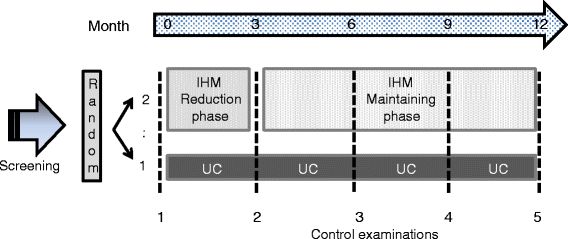The talent study: a multicentre randomized controlled trial assessing the impact of a 'tailored lifestyle self-management intervention' (talent) on weight reduction
- PMID: 26435840
- PMCID: PMC4589915
- DOI: 10.1186/s40608-015-0069-x
The talent study: a multicentre randomized controlled trial assessing the impact of a 'tailored lifestyle self-management intervention' (talent) on weight reduction
Abstract
Background: Overweight is considered an important risk factor for diseases in the context of metabolic syndrome. Lifestyle modifications are the means of choice to reduce weight in persons with a Body Mass Index of 28 to 35. The study examines whether there are any differences between two intervention strategies regarding weight reduction in overweight persons.
Methods/design: The study is a multicentre randomized controlled trial with observation duration of 12 months. Eight study centres are involved to include a minimal sample size of 150 participants. Randomization ratio is 2:1. Feasible persons are checked according to inclusion and exclusion criteria and after given informed consent are assigned randomly to one of two intervention programs: A) intervention group: comprehensive lifestyle modification program (Individual Health Management IHM) with 3 months reduction phase plus 9 months maintaining phase, B) control group: written information with advice for healthy food habits (Usual care UC). Participants of the IHM group have access to a web-based health portal and join 3 full-day and 10 two-hour training sessions during the first 3 months. During the remaining 9 months four refresh trainings will be performed. There are 3 different diet strategies (fasting, two-day diet, meal replacement) for free choice. Participants of the control group are provided with acknowledged rules for healthy food according to the German Nutrition Society (DGE). Examinations are conducted at baseline, after 3, 6, 9 and 12 months. They include body weight, waist circumference, blood pressure, laboratory findings and a bio-impedance analysis to measure body composition. Statistical analysis of the primary outcome 'change of body weight after 12 months' is based on ITT population including analysis of variance of the weight differences between month 0 and 12 with the factors 'group', 'baseline value' and 'study centre'. Secondary outcomes will be analyzed exploratively.
Discussion: The monitoring of the study will implement different measures to enhance compliance, avoid attrition and ensure data quality. Based on a blended learning concept and using web-based e-health tools the program promises to achieve sustainable effects in weight reduction.
Trial registration: German Clinical Trials Register Freiburg (DRKS): DRKS00006736 (date registered 20/09/2014).
Keywords: Diet; E-lifestyle modification; Individual Health Management (IHM); Network of health promotion; Overweight; Prevention; RCT; Web-based health portal.
Figures
References
-
- WHO. Global Health Observatory (GHO) data – overweight. 2008. http://www.who.int/gho/ncd/risk_factors/overweight_text/en/. Accessed 15 Apr 2015.
-
- Ng M, Fleming T, Robinson M, Thomson B, Graetz N, Margono C, et al. Global, regional, and national prevalence of overweight and obesity in children and adults during 1980–2013: a systematic analysis for the Global Burden of Disease Study 2013. Lancet. 2014;384(9945):766–81. doi: 10.1016/S0140-6736(14)60460-8. - DOI - PMC - PubMed
LinkOut - more resources
Full Text Sources
Other Literature Sources


